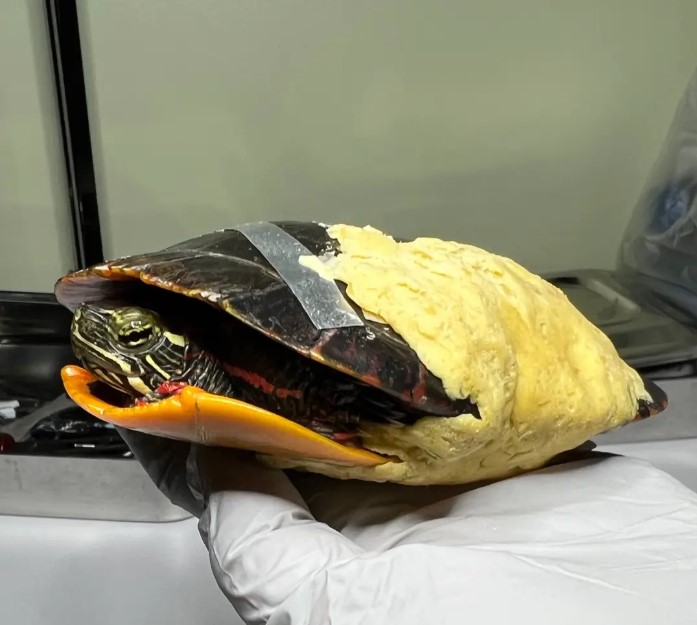Next time you have to sit through some guy’s boring litany about how tough he is, here’s a good way to end the blather: “Dude, you think you’re resilient, but you’re no turtle.”
“We have some turtles that come in just totally obliterated-looking. People tell us, ‘No way it’s going to survive.’ We give them pain meds, put the shell back together, and they pull through just fine,” said Drew Stevens, president of the board of directors of New Hampshire Turtle Rescue in Nottingham, the state’s only licensed turtle rehabilitation center.
He pointed to Ursinia, a current patient who, like virtually all their turtles, had been hit by a car.
“One side of her shell was gone, with intestines hanging out. We put them back in and supported them. She has grown tissue over it that has started to calcify,” he said.
Even though that will never become a true shell, it could be good enough. “We’re hoping that by the end of the summer, she’ll be releasable back into the wild,” he said.
This is the busy time of year for the center as female turtles move around looking for good places to dig a hole where they can lay their eggs. They prefer sandy or loose soil – easy to dig in – but getting to those locations from their usual homes can involve crossing roads, putting them in great danger.
“Almost all our (patients) are road strikes. Dog attacks is the second one – they think it’s a nice bony chew toy that’s got a gooey center – but maybe we get a handful of those at most. And every year, one or two fishhook cases,” Stevens said.
If you find a hurt turtle, N.H. Turtle Rescue are the folks to contact: Call or text (603) 417-4944. They even have a set of volunteers who will meet you and take the victim to Nottingham, in case a drive down Route 4 doesn’t fit in your schedule.
You can learn more Saturday, June 7, at Concord Public Library when the group will give one of its regular outreach programs starting at 11 a.m. They’ll probably bring Elvira, one of their “ambassador” turtles who live at the center. These are turtles who have been raised as pets and abandoned; they can’t be released into the wild because of the concern that they will spread diseases. Injured wild turtles are never kept at the center and always returned to the wild, if they live.
The non-profit launched in 2022, taking over from a program long operated within New Hampshire Fish and Game. They took in 60 turtles the first year, far more than they expected.
“The next year we took in over 190 turtles, last year over 160. So far this year up to maybe 45, which is quadruple the amount compared to this time last year,” Stevens said. “They’re mostly male, who are usually out and about a little earlier in the season. The real onslaught hasn’t happened yet, when all the nesting females are crossing roads.”
Medical procedures vary, from egg extractions when a female is hurt before laying her eggs to X-rays to leg splints to surgery.
“Every single case is different; there’s no one size fits all. We’re assessing the patient constantly,” said Stevens.
Dr. Victoria Jardon, who runs a mobile veterinary clinic, helps out. Not many veterinarians have experience with turtles or other amphibians and reptiles.
Stevens is the only employee of the bare-bones operation, which had an operating budget last fiscal year of just $30,147, much of it for processed commercial turtle food as well as plenty of fresh food to boost rehabilitation. “We didn’t intend to start a business, but that’s what this has turned into,” he said.
Income includes grants and donations. For more information, check https://nhturtlerescue.org.


 Return to the Concord Monitor
Return to the Concord Monitor